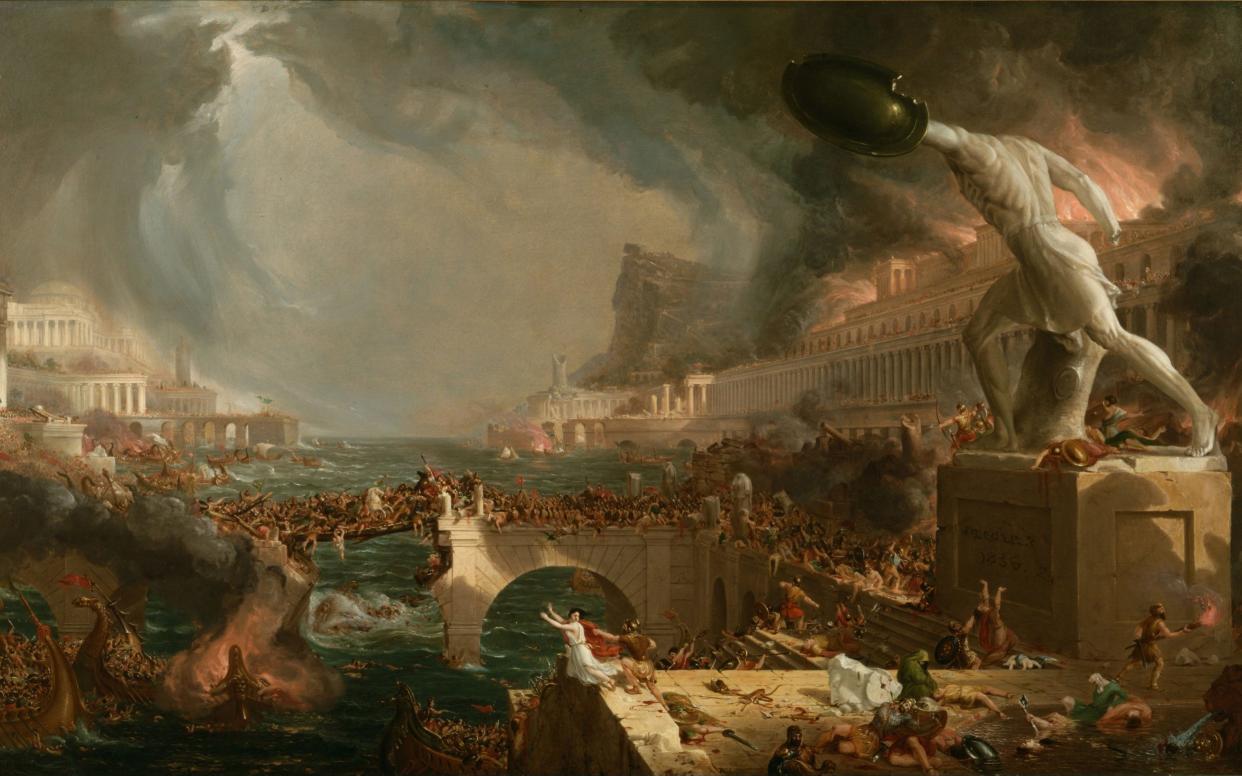The death of the British Library is symbolic of our new Dark Age

- Oops!Something went wrong.Please try again later.
“I think they’ve just given up,” said a friend, an academic specialising in esoteric aspects of the 17th century world of scholarship. He was referring to the British Library, whose systems were hacked in early October, with hundreds of thousands of files of user and personnel information stolen and, as the library refused to pay the £600,000 ransom the hackers demanded, sold on the Dark Web. Even worse for the global circuit of scholars, students and the simply curious who depended on the library – the largest and best research facility in the world, home to astonishing and eclectic items in its 170 million-strong collection – its digital catalogue was largely destroyed. The ability to search and order books, manuscripts, ephemera, treatises, music and everything else online went kaput just like that, leaving the lion’s share of the library collection in its storage facility in Yorkshire, stuck in the darkness of an analogue world long left behind.
My friend had popped out to speak to me, but he hardly needed to: the Rare Books and Music reading room, formerly the preserve of the most hardcore scholars (and me; I wrote my PhD in there) with a culture of shushing those who dared whisper, has slowly become a more of a hangout spot for teenagers who play on their phones more than they consult books. My friend told me how he had asked the security guards if they couldn’t keep some lid on the teenage babble, and they’d merely shrugged. Meanwhile, the many reading room staff sit behind Covid-era screens twiddling their thumbs, helplessly telling the few readers who try to get certain books that they’re all up in Yorkshire and because of the outage can’t be got.
I stopped going to the library shortly after the hack because it seemed futile. Seven months on, digital services remain largely out of service and will “for some time”, and the library – now just a shell with a few cafes and the occasional paid-for event in its atrium – is developing a flyblown, forgotten feeling. Meanwhile its chief executive, Sir Roly Keating, has resigned, and will leave in April next year. Officially he says he was only ever going to stay for 12 years, but one can’t help suspect he’s been utterly deflated by the apparent death of the once-great library he ruled over.
The death of the British Library feels symbolic – seismic in itself, but also redolent of a sense of a great age coming to an end and the dawn of a much darker one, more Handmaid’s Tale than Cool Britannia. This feeling oozes off the way our hallowed museums rush to send back treasures, caption wonderful old paintings with woke garbage, and sit victim to nasty young brats whose form of “green activism” is simply destroying beauty, chucking paint on everything from Van Gogh to the Mona Lisa.
The final death of the Cambridge I loved gives me a similar feeling. Just as it would have been unthinkable in the past for the Library to simply succumb, Cambridge’s hallowed lawns have also always remained inviolate, subject to highly specific rules, as ancient and important as the institution itself, and synonymous with the specific special world of Oxbridge. It is easy for the chippy or the entitled to laugh at the rules – “The right to walk across the College lawns are limited to senior members and fellows only”– but they are an essential part of the whole.
It isn’t clear whether the encampment on Kings Parade, on the lawn in front of King’s College, falls into this set of rules. I wrote to the college to ask, but didn’t receive a reply. This is no surprise, given that the University’s statement is a simpering and non-specific endorsement of the anti-Israel mob’s “right to protest”, plus a watery reminder to protesting students and “those who might be impacted by [the protests]” of the pastoral and therapeutic care they can call on within the university.
The ideological rot has of course been place for years, of course, as Oxbridge has been busy ridding itself of researchers asking verboten questions about race, promoting the most appalling woke maniacs, like now-Professor Priyamvada Gopal of Kings College, Cambridge (Gopal seemingly makes allegations of British racism the core of her life’s work) and decolonising its once-splendid and canonical curriculum. White students, especially those from prosperous backgrounds or private schools, are penalised by admissions officers, as the universities try to replicate US-style affirmative action policies. The students themselves spend their lives not in pursuit of understanding the great cultural inheritance all around them, but locked in a dreary spiral of bad-tempered protests revolving around the phantom of “systemic racism”, from Rhodes Must Fall to Palestine.
All of this has eaten away at the utterly unique brilliance of our ancient universities. But there is something especially newly chilling about the hideous Gaza-solidarity encampments, reminiscent of wilful homelessness and the squalor that goes with all that, plus the unavoidable death-cult aspect of it all, given that the protesters who, in lionizing Hamas, seem to be in favour of more October 7th.
The local elections capped off the sense of encroaching darkness, as Sadiq Khan won his third term as mayor of an ever-dirtier, poorer and more crime-ridden London, and the once-formidable Tories were utterly obliterated by a Labour still full of batty loons, whose true plans are lost under the penchant for flip-flopping.
I used to scoff when people cried “apocalypse soon” and “Handmaid’s Tale” – particularly after Trump’s election. Trump or no Trump, the past year has taught me there’s nothing funny about that fear anymore.

